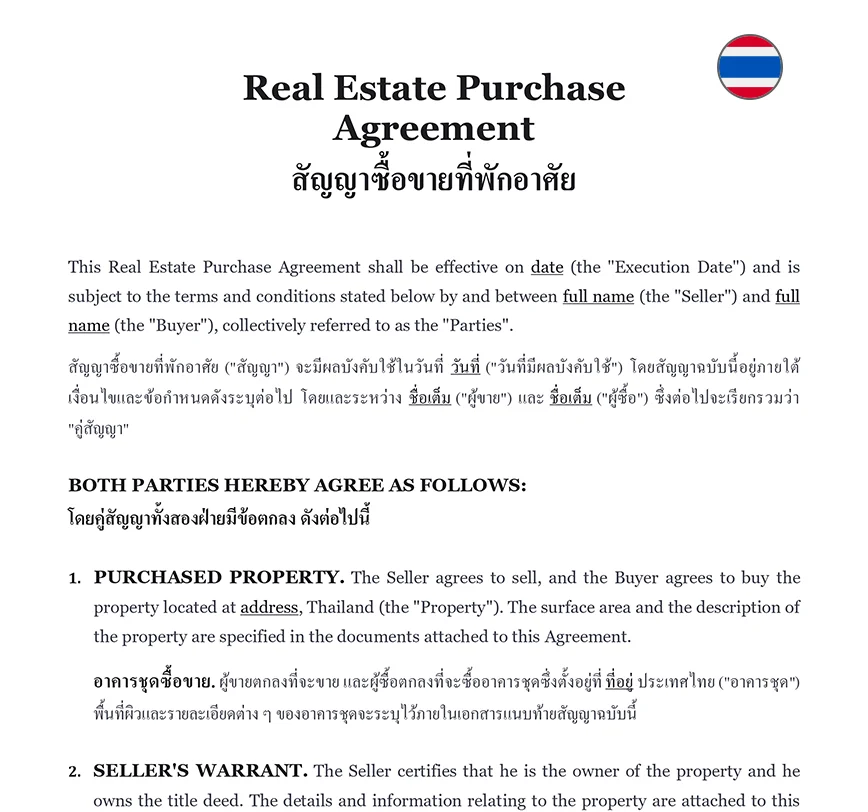Buying a house as a foreigner in Thailand comes with clear boundaries: while foreigners hold nearly 20% of new condo titles in prime Bangkok districts, direct land ownership remains strictly off limits except in rare, high-investment cases.
Are you considering securing a home or investment property in Thailand in 2025? Navigating the evolving legal landscape and stringent documentation rules has never been more important, as regulatory reviews and compliance enforcement have tightened in recent years.

Securing the right property as an overseas buyer hinges on understanding ownership laws, transfer regulations, and practical strategies for risk management. This guide gives you a concise roadmap: what you can own, the steps involved, and the pitfalls to avoid.
Key Takeaways
- Foreigners cannot own land but can buy condos (up to 49% quota) or secure 30-year leases with possible renewals.
- Nominee setups and shell companies are illegal; all ownership must comply with Thai law.
- Transfer funds from abroad, complete an FET form, and verify title deeds before purchase.
- Expect 7-10% in fees and a 4-8 week timeline for most transactions.
- Mortgages are limited; condo payments must be wired internationally for legal registration.
- Work with licensed agents and Thai lawyers to verify titles, leases, and developer credentials.
- Top locations include Bangkok, Phuket, Pattaya, and Chiang Mai for lifestyle and rental potential.
- Balance location, budget, and legal compliance for a secure, sustainable investment.
Looking to buy, sell, or lease property in Thailand?
Our team handles registration, title searches, purchase and lease agreements and all property rights.
Table of Contents
-
Foreign Property Ownership Rules in Thailand
-
Buying a House or Condo as a Foreigner
-
Financing and Payment Options for Foreign Buyers
-
Risks, Scams and Due Diligence
-
Best Locations and Market Insights 2025
-
FAQ: Foreign Property Buying in Thailand
-
Conclusion
Foreign Property Ownership Rules in Thailand
What Properties Can Foreigners Own in 2025?
Foreigners are prohibited from directly owning land in Thailand under the Land Code Act, with only rare exceptions for Board of Investment (BOI) cases requiring at least THB 40 million invested for residential use. Only a select few qualify for this BOI route and these approvals are non-transferable.
Most foreigners buy freehold condominium units, provided foreigners do not exceed 49% of the total sellable area in a single building as set by the Condominium Act. Leasehold is another common path, allowing up to a 30-year lease on houses or land, with possible (but not guaranteed) renewals.
For indirect land control, some use a Thai Limited Company structure. Strict regulations apply: Thais must hold most shares, nominee ownership is illegal, and companies must have genuine business activity to comply with the Foreign Business Act.
Required Documents and Approvals for Foreign Property Buyers?
To complete a property purchase, buyers must provide clear documentation at every step:
- Passport copies and valid visa (if required for longer stays)
- Foreign Exchange Transaction Form (FET) confirming funds brought from abroad (required for condo registration)
- Signed Sale and Purchase Agreement, plus deposit receipt (often 10-30% down)
- Proof of international wire transfer, matching buyer name and property purchase
- Comprehensive property title search, confirming clear ownership
If purchasing through a company or special BOI program, additional approvals and corporate paperwork apply.
Legal due diligence is critical: always use licensed local advisors to verify property titles, confirm lease terms, and review all contracts for compliance.
Foreign buyers in Thailand can own freehold condos or long-term leases, but land ownership remains out of reach except for rare investment cases. Understanding required documents and legal frameworks ensures your purchase stays secure, compliant, and stress-free.
For a deeper understanding, read our Land Foreign Ownership in Thailand: Key Regulations 2025 guide.
Buying a House or Condo as a Foreigner
Step-by-Step Property Buying Process
Begin by researching areas and property types allowed for foreigners, such as condominiums or land via leasehold.
Work with a reputable agent knowledgeable in Thai property law, then select your preferred ownership route:
- Buying a freehold condominium (maximum 49% foreign quota per building)
- Leasing land/house for 30 years (with possible renewals)
- Purchasing through a Thai limited company (subject to strict legal compliance)
Verify the property’s title deed, conduct due diligence on ownership, and engage a licensed lawyer.
Once satisfied, negotiate purchase terms, place a deposit (typically 10-30%), and proceed to official registration at the Land Office.
Step-by-step details can be found at the Thailand Land Department.
Fees, Taxes and Timelines
Expect total buyer costs to include:
- Transfer fee: 2% of appraised value
- Specific business tax: 3.3% (if applicable)
- Stamp duty: 0.5%
- Legal and agency fees: usually 3-5% of property price
Most transactions complete within four to eight weeks, with staged payments common for new builds.
For condos, all funds must be wired from overseas, with the FET form required for registration and tax compliance.
For in-depth cost structures or official tax rates, consult the Thailand Revenue Department.
Financing and Payment Options for Foreign Buyers
Mortgage and Financing Availability for Thai Property
Securing a mortgage in Thailand as a foreigner is rare but not impossible. Most Thai banks do not offer direct mortgages to non-residents, except for a few limited programs with high requirements.
Common alternatives include:
- Offshore loans: Some international banks extend credit for Thai property, often with higher down payments and strict approval.
- Developer payment plans: Many new-build projects offer flexible staged payments until completion.
- Thai company route: If a legitimate Thai company holds the property, commercial mortgage terms may apply (with compliance risks).
Applicants generally need:
- A valid passport
- Proof of income and funds abroad
- Credit history
- Foreign Exchange Transaction (FET) form for condo purchases
Mortgage approvals often take 30-60 days, while developer payment plans can start within days of deposit.
Payment Strategies and Funding Tips
Transfers must come from overseas and be documented for FET compliance at the Land Office, especially for condos.
Key practices to streamline funding:
- Use international wire transfers in your name
- Obtain a FET form from the receiving Thai bank for each transfer above USD 50,000
- Time transfers to avoid fluctuating currency rates or compliance bottlenecks
Staged payments provide leverage when negotiating upgrades or incentives with developers. Escrow arrangements can add security for off-plan purchases.
Always check with the Bank of Thailand for the latest on currency control regulations.
Risks, Scams and Due Diligence
Common Legal Risks and Pitfalls for Foreigners
Property scams in Thailand most often target foreign buyers with:
- Fake real estate agents
- False ownership promises (especially for land or lease renewals)
- Over-promising developers for off-plan or incomplete projects
Legal risks are significant, including:
- Prosecution for nominee company ownership structures, which are actively monitored and prosecuted by agencies such as the Thai Anti-Money Laundering Office
- Leasehold contracts where renewals are not honored after the 30-year term
- Deposit loss or unregistered property rights in new developments
Protecting Your Investment from Fraud
To safeguard your property purchase, always:
- Run a full property and title deed search at the Land Office
- Use only licensed, reputable real estate agents and Thai property lawyers
- Inspect buildings and verify developer registrations before payment
Shortcut methods, nominee share structures, or unregistered sales place your investment at serious risk.
A systematic due diligence framework for foreigners includes:
- Confirm seller’s identity and legal authority
- Review land title deeds for encumbrances
- Check lease terms and renewal guarantees
- Verify FET forms and offshore fund transfers
- Obtain a legal review of all contracts
Always prioritize transparency, seek documentation for each stage, and rely on recognized legal professionals for transactions.
For a deeper understanding, read our Property Due Diligence: Steps for Buyers guide.
Best Locations and Market Insights 2025
Top Locations for Foreign Buyers in 2025
Foreigners searching for property in Thailand typically focus on four prime areas, each with unique advantages:
- Bangkok: Urban lifestyle, strong rental market, access to top schools, hospitals, and business centers.
- Phuket: Resort-style living, high tourist demand for rentals, proximity to beaches and golf courses.
- Pattaya: Affordable condos, vibrant nightlife, established expat community, growing infrastructure.
- Chiang Mai: Cooler climate, creative culture, slower pace, rising digital nomad scene.
Demand for freehold condos in these areas remains robust, with 2025 market data showing price growth in coastal locations and steady interest in urban centers.
Key Factors for a Successful Purchase
A successful property purchase in Thailand involves balancing these essentials:
- Lifestyle fit: Match property features with daily needs and long-term plans.
- Budget alignment: Factor in legal, tax, and transfer fees (often 7-10% for foreigners).
- Legal security: Verify title deeds and work only with licensed, bilingual agents.
- Market outlook: Research projected demand, new developments, and neighborhood amenities.
For up-to-date regulations and area-specific trends, review guidance from the Thailand Ministry of Interior and leading Thai real estate market reports.
Choosing the right location starts with knowing your goals, then aligning them with verified legal structures and market data for lasting confidence and value.
FAQ: Foreign Property Buying in Thailand
Can a foreigner own land or property if married to a Thai national?
- Foreigners cannot directly own land in Thailand, even when married to a Thai spouse.
- Land may be registered in the Thai spouse’s name only if the non-Thai spouse signs documents confirming no foreign funding.
- Legal reviews and compliance steps are mandatory, so consider professional advice for marital property.
What residency or visa status is needed to own or manage property?
- No Thai visa or residency is required to buy or own a condominium as a foreigner.
- Long-term stays, house management, or leaseholds may require practical presence in Thailand, such as a long-term visa for convenience.
How much are legal, tax, and administrative fees for foreign buyers?
- Legal and administrative fees typically range from 7-10% of the condo purchase price, slightly less for leasehold.
- Always request a detailed cost breakdown at the outset of all transactions.
Can foreigners rent out Thai property or use it for business purposes?
- Condo owners may rent out units, depending on building regulations and Thai law.
- Using real estate for business requires specific permissions and compliance with the Foreign Business Act.
Conclusion
Securing property as a foreigner in Thailand is achievable with the right structures, knowledge, and proactive steps: delivering clarity, confidence, and peace of mind throughout your investment journey.
You can take action today by researching properties with the correct ownership models, gathering essential documentation, and prioritizing due diligence at every stage. Always select licensed local experts, verify title deeds before paying deposits, and budget for all legal and tax requirements in advance.
If you are ready to proceed or need guidance tailored to your situation, contact us. Themis Partner provides transparent, practical support to protect your interests, ensuring every step aligns with Thai law and your financial goals.

